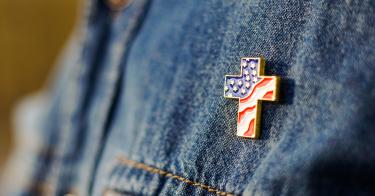Since Donald Trump’s surprise victory in the 2016 election, a rash of articles, surveys, and books have claimed that many—maybe even most—Americans in flyover country are “Christian nationalists.” That’s supposed to sound scary. But the term is mostly used as a smear against conservative Christians who defend the role of religion in American public life.
Sociologists Andrew Whitehead and Samuel Perry give the perceived threat a scholarly gloss in their recent book from Oxford University Press, Taking America Back for God. They define Christian nationalism as “an ideology that idealizes and advocates a fusion of American civic life with a particular type of Christian identity and culture.” What’s more, it “includes assumptions of nativism, white supremacy, patriarchy and heteronormativity, along with divine sanction for authoritarian control and militarism.” That’s quite a parade of horribles.
How many such people are there? In a survey conducted between 2007 and 2017, the pair found a whopping 52% support some form of Christian nationalism.
A later study conducted by the Brookings Institute and the Public Religion Research Institute offers a more modest estimate. The study found 29% of Americans fall somewhere on the “Christian nationalist” spectrum. Over half of Republicans reportedly showed some degree of support, with 21% counting as “adherents” and 33% as “sympathizers.”
But even if just one-third of Americans support “Christian nationalism,” isn’t that still shocking? Left-leaning journalists certainly think so. “Most Republicans Support Declaring the United States a Christian Nation,” reads one Politico headline. “Americans are Growing More Accepting of Christian Nationalism,” trumpets the Washington Post. A recent NPR headline warns: “More Than Half of Republicans Support Christian Nationalism….”
Who, then, are these Christian nationalists? One might expect critics to name writers like Stephen Wolfe, who seems to defend a Protestant confessional state in his recent book, The Case for Christian Nationalism. Or Catholic integralists, who advocate a subordination of political power to the Holy See. One can find truly dark elements among integralists. Look no further than Adrian Vermeule’s defense of “integration from within.”
But these thinkers don’t seem to figure in the typical tirades against Christian nationalism. Whitehead and Perry, for instance, don’t make a single reference to integralism in their book. Stephen Wolfe rarely appears in Politico or Washington Post stories warning of the threat posed by Christian nationalism.
Rather, such critics seem to be more concerned with movements and policies that fall under the banner of “Trumpism.” Whitehead and Perry have previously written that “voting for Trump was, at least for many Americans, a symbolic defense of the United States’ perceived Christian heritage.” In a 2021 Time article, Whitehead argued, “In its most extreme form [Christian nationalism] legitimizes the type of violence we saw on Jan. 6 and the recent flood of voting restrictions.”
Take, for instance, the 2021 election reforms passed in Georgia, Florida, and Texas. Among other things, each of the three states extended ID requirements for in-person voting to absentee ballots. Despite evidence to the contrary, Whitehead contends that these election measures suppress minority voters. And this, he believes, signals persistent racism and anti-democratic sentiment. In a word: Christian nationalism.
In a recent article in Time, Jared Yates Sexton likens the resurgence of “Christian nationalism” in America to that in Russia under Vladimir Putin and Hungary under Viktor Orbán. Sexton explains that today’s Christian nationalism began with the “merging of Christianity and state power” in the Holy Roman Empire.
Its resurgence in the U.S., Sexton insists, has resulted in “suffering inflicted on refugees, boldfaced white supremacy and cruelty, attacks on gay and transgender Americans, open anti-Semitism, the destruction of Roe v. Wade, and even an attempted coup.”
For Sexton, it seems, anyone from Vladimir Putin, to moms who don’t want their daughters changing in locker rooms next to men, to the five Supreme Court justices who voted to overturn Roe could be a Christian nationalist.
Or take Whitehead and Perry’s claim in a recent Baptist Joint Committee report on the Jan. 6 riots that “white Christian nationalists” were more likely to “eschew safety measures” and prioritize “the economy and liberty over the vulnerable” during the COVID-19 pandemic.
>>> WATCH/LISTEN: Is America Still “American?”
They’re also more likely to hold “anti-vaccine attitudes” and oppose “any federal gun control restrictions due to the belief that the Second Amendment is divinely inspired.” They’re more likely to “fear immigrants and endorse anti-immigrant policies” and oppose “same-sex marriage and transgender rights.”
Did Whitehead and Perry ask respondents if they fear or hate immigrants? Not likely. This sounds like their spin on those who simply want a more secure border.
Or how about those who oppose “same-sex marriage and transgender rights”? Would this include Christians who oppose, say, the sterilization and genital mutilation of children? (A recent Mother Jones article suggests this.) What about a female athlete who refuses to compete with a biological male athlete claiming to be female? Or a baker who declines to design a cake for a same-sex wedding because it conflicts with his sincerely held religious beliefs? Does this make them Christian nationalists?
The term “Christian nationalism” is clearly a wax nose. Its lack of standard definition allows critics to bundle evils like white supremacy and racism with standard conservative views on marriage, family, and politics.
If “Christian nationalism” referred to those who endorse the integration of church and state power, racism, and white supremacy, then we should reject it. But not one national figure endorses that platform. The term, as used in the media, is mostly a rhetorical tool to smear and silence conservatives.
Of course, if “Christian nationalist” can mean any subset of these things, then sure, there are a lot of them out there. Heck, you might be one of them.
This piece originally appeared in The American Mind




